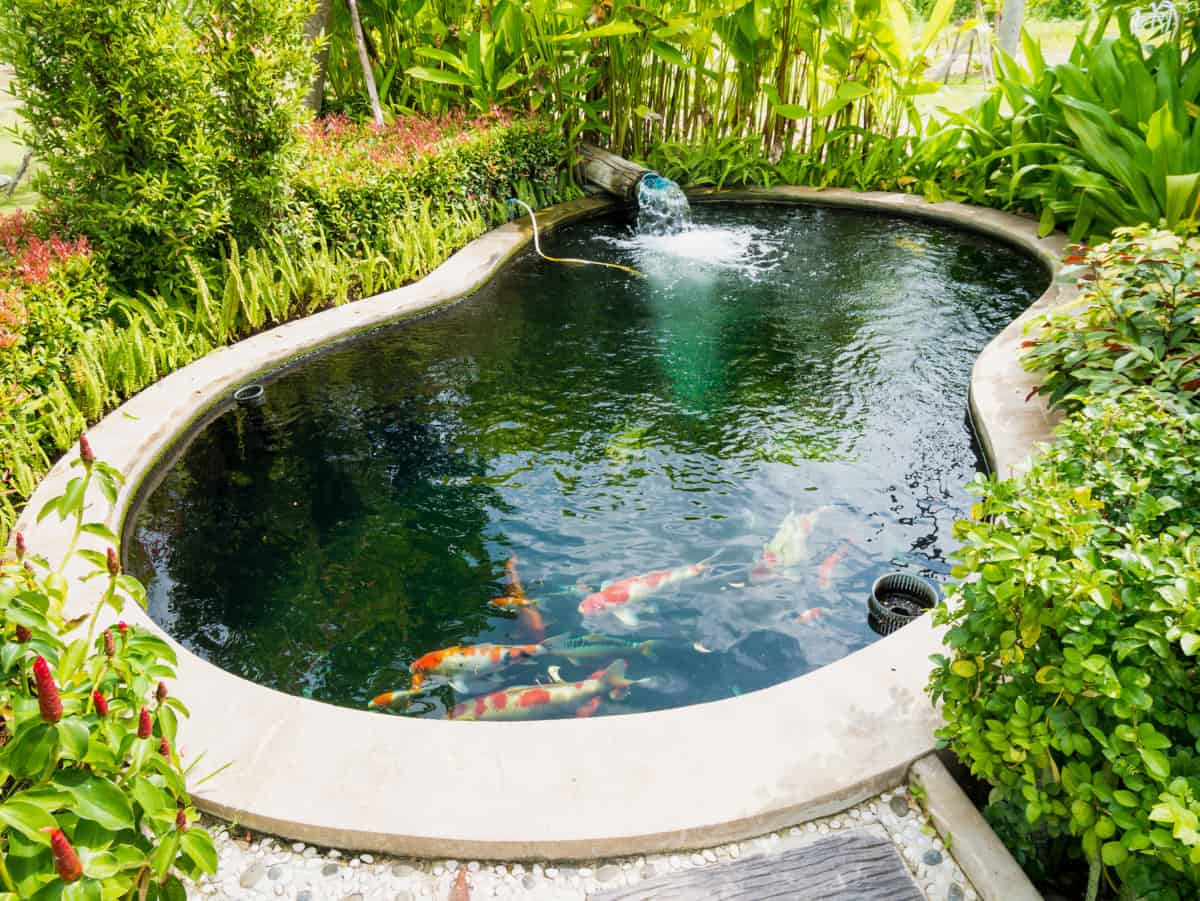Because a garden pond is a living breathing ecosystem you need to balance all of the different organisms that live within it. Keeping a pond clear of algae and debris is often difficult.
When the eco-balance goes out of whack, the water becomes dirty and murky, usually because of excess rot, debris, and algae and pond scum.
We have 7 Ways to keep your pond clear. Simple steps you can take to ensure your pond is clean and clear.
Let’s have a look at some simple ways of managing this all-important balance and keeping your pond clear.
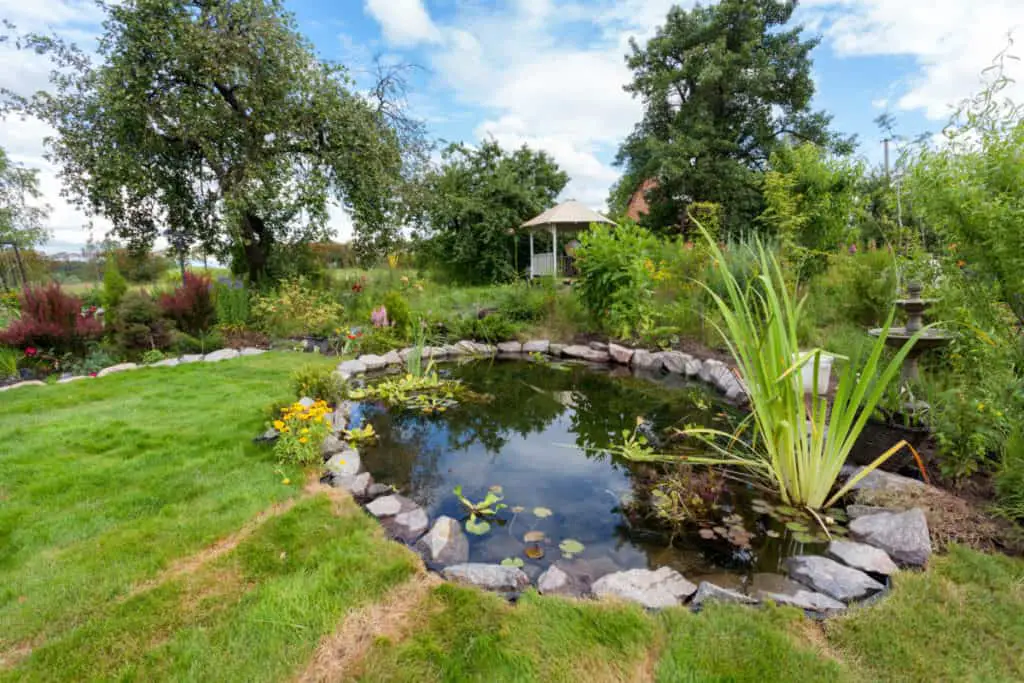
Table of Contents
7 Ways To Keep Your Pond Clear
A pond in your garden is a wonderful idea. When all is well it will bring you so much joy, giving you a serene place to sit listening to the bubbling water and watching the fish or wildlife play.
A garden pond is a little bit of a commitment, however, and one of the biggest challenges you might have to tackle is keeping your pond clear.
Ponds built correctly can become a natural eco-system that work perfectly with their surroundings.
Choosing between a natural wildlife pond and a fish pond is a personal choice. Most people who choose a fish pond want to be able to see their fish in all their glory and strive for a clear looking pond.
After all koi carp a breed to be seen from above. Their colors and patterns should be admired through crystal clear pond water.
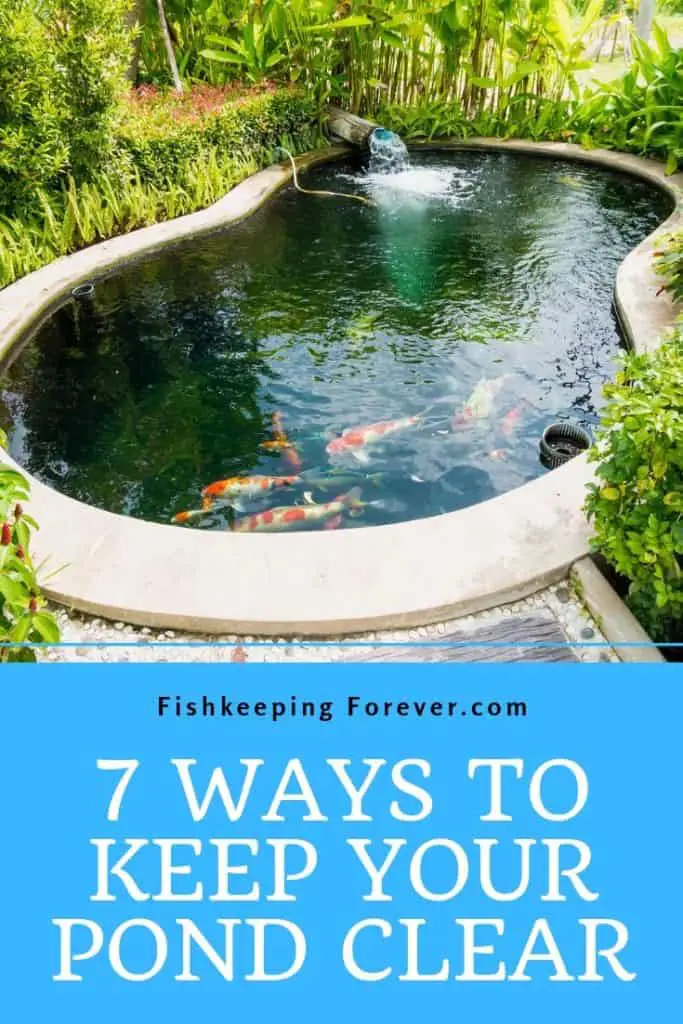
Everything in the pond puts different components into the water, such as oxygen, nutrients, and bacteria, as well as taking things out. This balance of nutrients in the water is what you need to maintain.
Let’s have a look at some simple ways to manage this all-important balance and keep your pond clear.
Does Your Pond Need To Be Clear?
First of all – does your garden pond actually need to be clear?
‘Clear’, is a subjective word, and in essence, because it is a garden pond, it will never be completely clear. You don’t need to maintain a level of hygiene as you would for an indoor aquarium.
A pond is a living ecosystem of its own and if all is well it will supply the fish or wildlife in it with everything they need, in which case it won’t be clear. There will be algae and plants and moss and bugs and all sorts of things going on in it.
It should be clean, however, in that it is free from rot and anything that can cause your fish to become sick. Some healthy algae and pond creatures like insects are good – murky, cloudy or smelly water is not.
There are two main types of garden ponds – ornamental fish ponds and wildlife ponds. Ornamental fish ponds, whether they are in-ground, above ground or in containers will need to be clearer than wildlife ponds. There are a few reasons for this.
Why should you keep a garden fish pond clear?
- The fish in the pond are not necessarily native to your area and may need extra care
- The water needs to be filtered and oxygenated and having leaves and other muck in the pond will clog up filtering systems
- You would probably like to see your fish.
If you have a wildlife pond in your garden, this is a different world altogether. A wildlife pond is built to fuse into the natural habitat of your garden and encourage wildlife to come and visit. It doesn’t necessarily need to be filtered and a certain level of carefree muckiness is good for it.
Why does a wildlife pond not need to be as clear?
- The wildlife in the pond will thrive on bacteria, algae, and insects in the water
- The wildlife will prefer places to hide and nest
- Wildlife ponds fare better when they are in the sun, which does tend to encourage algae growth
- A flourishing wildlife pond will naturally be muckier, and you may need to just sit back and accept that.
That being said, you still want a certain level of clarity in a garden pond, whether it is an ornamental fish pond or a thriving hub of wildlife activity.
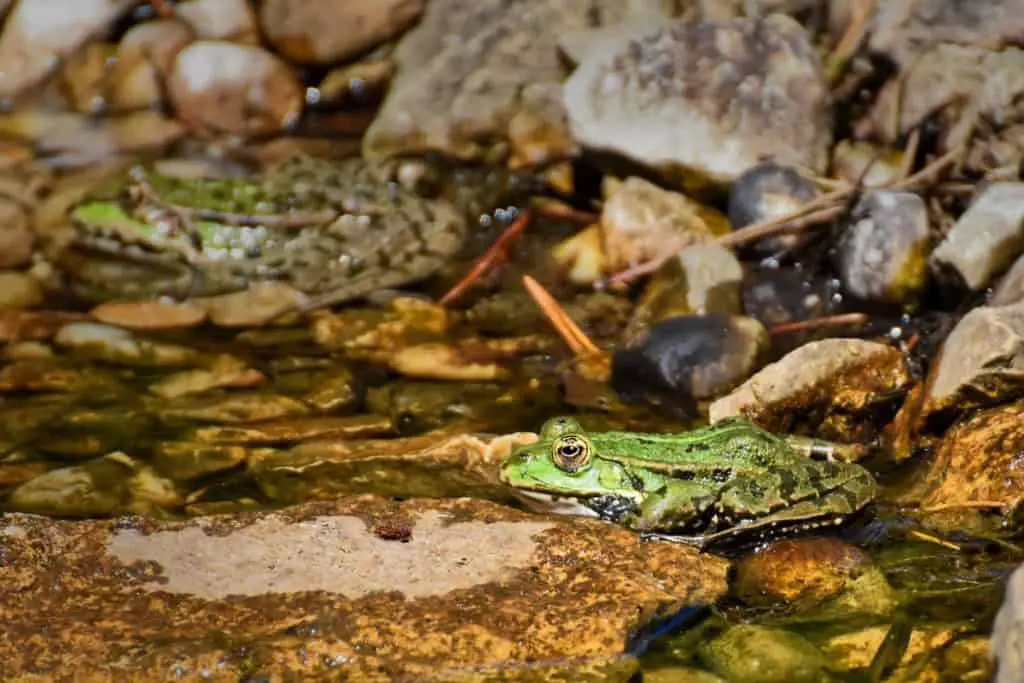
Important Note: Clear Doesn’t Always Mean Clean
While you might be striving for clear water so you can have a gorgeous fish pond, clear water doesn’t automatically mean clean water. The water may be affected by chemicals or pollution, or there may be some disease in the water or something rotting that you can’t see.
If your fish don’t seem to be happy and healthy then don’t presume that the water is clean even if it looks clear.
Make sure that you test the water regularly and chat to your local fishkeeping expert if you are unsure about the health of your fish. Also make sure that you only use fertilizers and pesticides in your yard that are safe for the fish, and keep your pond safe from runoff from any outside sources of pollution.
7 Ways To Keep Your Pond Clear
Keeping a pond clear is one of the primary ways to keep your fish well, so you should make it one of your first priorities. Let’s have a look at some ways you can help to keep it clear.
1. Choosing the right pond location
Ok, this one could be a bit difficult to address if your pond is already in the ground, but your choice of location could help to keep your pond clearer.
If possible, don’t place your pond under deciduous trees, which will clog up the pond with leaves. If you get a lot of leaves falling into the pond, you should be scooping them out every couple of days before they get a chance to rot. You probably need to do this more often in autumn or when it’s windy.
When deciding where to put your pond, consider that it is best located in some direct sun and some shade.
Wildlife creatures within the pond enjoy the warmth of the sun, and this is best for nesting frogs and their spawn.
If you are considering an ornamental fish pond, however, you can keep it clearer by locating it mostly out of the direct sun.
Locating the pond in the sun will encourage algae growth, but healthy algae growth is ok within a pond environment. The animals like to feed on it and the algae will help to put oxygen into the water and balance water nitrate levels as well.
Balancing the algae growth in the water is the next step in keeping your pond clear.
2. Create the right balance of algae and plants
Plants are essential for a garden pond – they not only look wonderful, but they also help the balancing ecosystem.
Plants provide oxygen for the water. But if you have too many plants you can throw the oxygen balance out, with the plants taking in too much oxygen and giving off too much carbon dioxide.
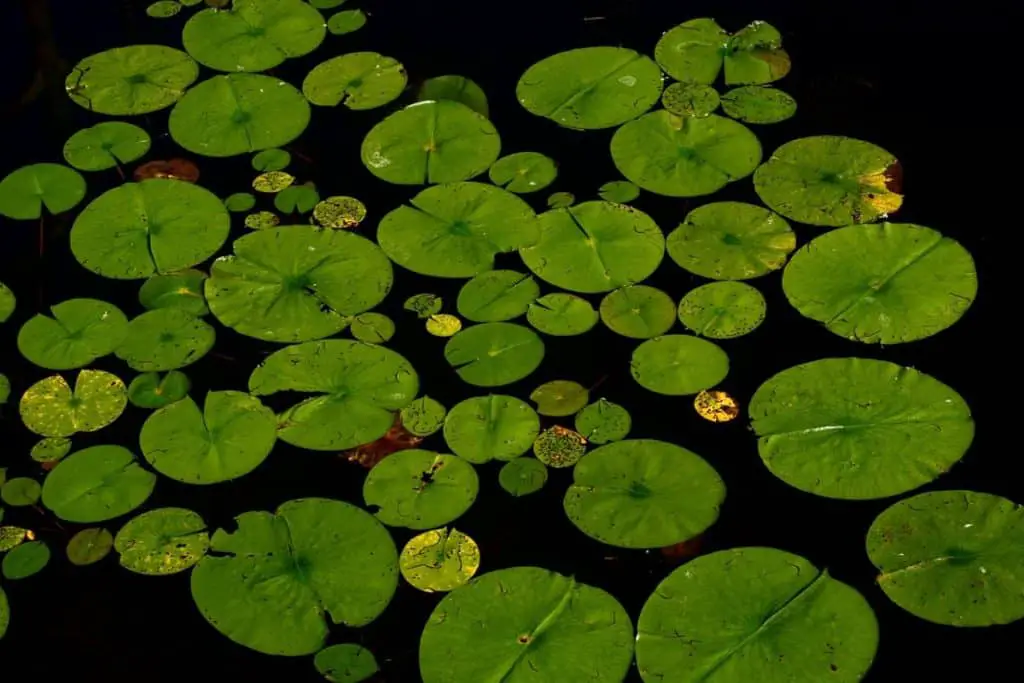
The fish produce nutrients that are absorbed by plants, but if you don’t have enough plants to do this you will encourage algae growth with the excess nutrient buildup.
Having the right kinds of plants and the right amount of them is one of the simplest ways of keeping your pond water clear and clean. You should aim for at least 40% and no more than around 60% of the surface area to be covered or shaded by plants.
Oxygenating and floating plants provide shade and oxygen, use up nutrients and reduce the growth of algae, which will keep your pond clear.
Some great plant options include:
- Water Lilies
- Lotus
- Anacharis
- Hornwort
- Parrot’s feather
It can be a difficult balance to strike because too much shade isn’t good for the fish or the water, whereas too much sun brings in extra algae. Again, some algae are good for the pond, but you need to manage the balance of this as well.
You could even have a gorgeously clear fish pond one day and then a lush shag pile of green algae can appear almost overnight.
This is called an algal bloom and can happen in a burst of warm weather or direct sunlight when combined with the fish waste already in the pond. When this happens algae can take over your pond somewhat and needs to be kept within moderation.
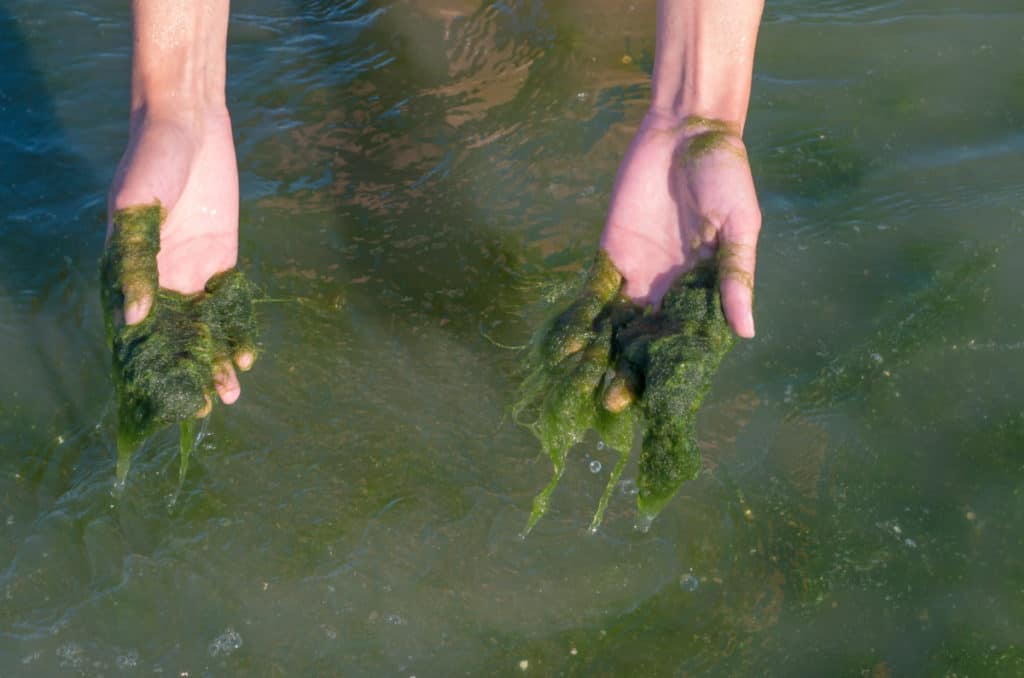
It is normal in a balanced pond to have some algae growth, but too much not only looks bad it is isn’t good for the fish. Too much algae will remove oxygen from the water.
Algae on the bottom and sides of the pond are fine, but you need to limit it from the surface. You can avoid algae by:
There are algaecides you can buy to put in the pond, but use these as a last resort. They aren’t good for the environment and if used improperly can kill your fish.
3. Encourage fish and wildlife that clean
Certain fish and other water creatures love to clean the water – so having more of these in your pond will definitely help.
Happy water-cleaning creatures include:
Siamese algae eaters, which are a freshwater carp with huge appetites. They eat algae both green and red and clean up pond scum as well. They may eat small fish like minnows but pair well with larger koi and goldfish breeds.

Common plecostomus, which are voracious suckermouth catfish. These can grow to be quite large so you need a bigger pond to house them (at least 3500 liters). You only really need one of these, but they get along well with the rest of the pond community.
However, plecostomus don’t like cooler temperatures and must be brought inside if the temperature drops below 51 degrees Fahrenheit.
Pond loach will clean up algae, pond scum and also insects as well. They are quite sociable fish which get along with koi and goldfish.
Black Japanese trapdoor pond snails. All snails are great for cleaning ponds, but smaller snails don’t survive well in the colder months and in the warmer months can lay way too many eggs.
Black Japanese trapdoor pond snails are bigger and hardier – they will do the cleaning you need and they give birth to individual babies, so will maintain their population balance nicely.
4. Have a healthy, well-fed fish population
If you have too many fish in the pond, then your ecosystem will be a bit out of balance. There will be more fish waste than you want to handle, and the fish won’t be happy without their own personal space.
As a rough guide, you shouldn’t have more than 25cm worth of fish for every 400 liters of water in the pond (or 10 inches per 100 gallons).
If you overfeed your fish this leads to dirtier water as well, as the excess food will either lead to excess fish poop or just rotting uneaten food. Either don’t overfeed your fish or, be vigilant about removing leftover food.
Another way to reduce fish waste is to buy top quality food that is perfectly balanced for your fish’s diet. If you feed them the right amount of the right food, their bodies will use up the nutrients in the food and produce less waste.
5. Choose the right filter and pump
Choosing the right filter for your pond is essential for keeping the water clear and clean. You need to select a pump and filtration system for the volume of water in the pond, otherwise, you will be overburdening your pumps.
As an estimate, your pump should circulate the equivalent of the whole of the pond’s water at least once every hour. You should know how much water is in your pond and check the limitations of the pump before buying it.
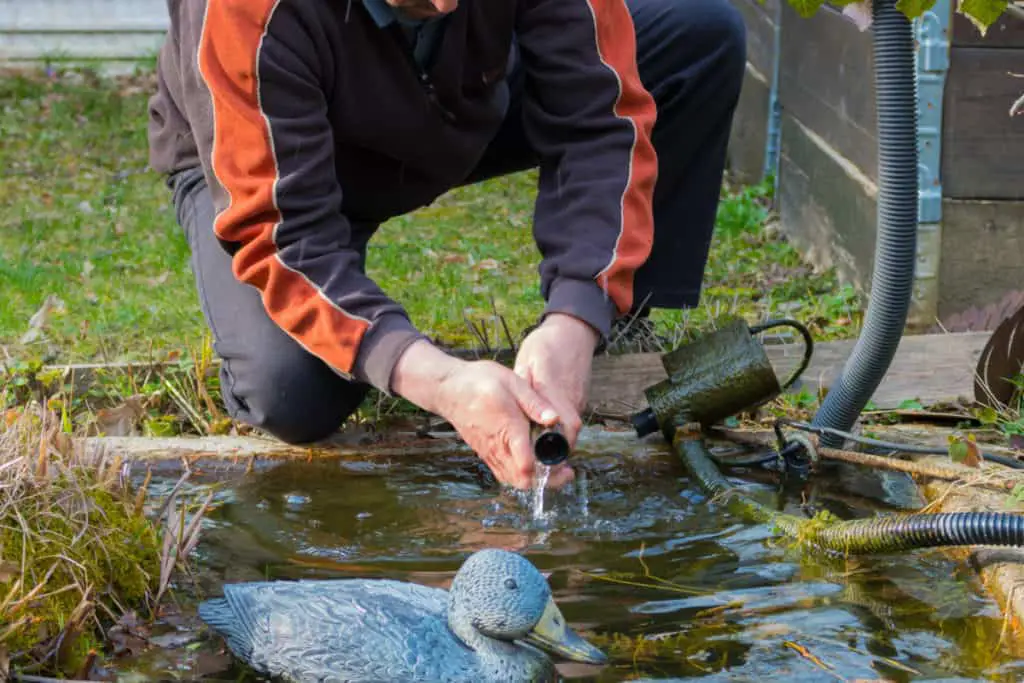
Your filter should also match the volume of water in the pond. If you have an ornamental fish pond you will absolutely need a filter to look after the health of your fish. If you have a wildlife pond a filter is not as essential.
Try a plant filter system
You could try setting up a plant filter system which will also help to keep your pond water clear.
This is done by setting up a small channel or filtration pond that is filled with fast-growing, oxygenating plants like water lettuce or water hyacinth. The base of this filtration pond should have around 5cm of pea gravel.
Your water for the pond will travel slowly through this plant filter before reaching the main pond which will add oxygen and beneficial bacteria, removing nutrient waste and catching debris as well.
If this kind of system is a bit complicated or you don’t have room for it, you can float sachets or pellets of barley straw in your pond to work as a plant filter on a smaller scale. Barley straw helps by reducing extra nutrients in the water, the same as plants do, to reduce algae and pond scum growth.
6. Clear your pond from debris
Everything mentioned above will help, but one of the best ways of keeping your pond clear is by putting in some regular grunt work.
You should regularly clear the pond from debris, including:
- Checking your water pump and filter for any clogs or debris
- Scooping leaves from the surface
- Removing uneaten food (or using more appropriate food for your fish breeds to reduce waste)
Any rotting debris and fish waste not only stops the water from looking clean, but they increase the ammonia levels in the water, which is not good for your fish.
You can also buy nifty products like this awesome pond scum vacuum for your pond.
OASE 602401853010 Pondovac Classic Pond Vacuum Cleaner
Features
- Max. Suction depth: 6 ft.High-power suction to a depth of 59 inch.Maximum suction depth of 78 inch
- Suction hose length: 13 ft
- Operating voltage: 110-120 Volt / 60Hz. Power consumption: 1200-1400w
- Power cable length: 13 ft
- Limited Warranty: 2 years
You should test the water often for levels and add beneficial bacteria as needed. You can buy products such as this to help.
PondWorx Pond Bacteria - Formulated for Large Ponds, Water Features and Safe for Koi - 4 Gallon Value Pack
Features
- Eliminates muck, dead leaves, odors and other organic matter that can harm a pond or lake
- Super charges naturally occurring bacteria to consume micronutrients
- Safe for humans, fish, livestock, pets, birds, swimming, consumption and irrigation
- 1 gallon treats 1 surface acre, 4-feet to 6-feet deep, helps break down dead leaves and weeds on the pond floor
- This product is not meant for algae treatment
7. Keep your pond cool
Maintaining the right water temperature for your fish will also keep them healthy and maintain the right balance of bacteria in the water. You should keep the water lower than 24 degrees Celsius (75F) to best look after your fish.
You can keep things cool by making sure that your pond has enough shade, as well as enough depth to give your fish lots of lovely cool spots to hang out in. Making sure that your pond pump works properly will also help to keep the water cool and fish happy.
Adding aeration to your pond will also help to keep it cool, so you may consider adding a fountain or waterfall as well.
Go natural
Have you ever considered building a wildlife pond? These natural garden ponds use mother nature to form and enhance these garden ponds.
Packed with insects, frogs and other wildlife found in your garden these ponds fit well into natural gardens and wildlife areas. Usually fish-free ponds, they are not for everyone but certainly play their part in making your garden look interesting and special.
Read more about these wonderful ponds here.
Keeping Your Pond Clear – In A Nutshell
Everything that lives in a pond adds essential things such as oxygen, nutrients, and bacteria into the water, as well as taking things out. This balance of things in the water is what you need to maintain.
In summary, you can keep your pond clear by following these steps:
- Locate your pond partially in the sun and partially in the shade. Your pond should get between 40-60% of its shade from plants. Don’t have deciduous trees near your pond.
- Maintain a healthy balance of algae and plant life in your pond
- Maintain a healthy balance of fish life in your pond – don’t overfill your pond with fish and don’t overfeed the ones that you have. Choose the most appropriate fish food for your breeds that you can source.
- Put algae and pond scum cleaners in your pond including plants, fish and snails.
- Put some grunt work in and clean your pond from debris regularly.
- Have the right mechanical products for your pond including the right filter and pump for the volume of water you are pumping through them. Keep your pump and filter clean and working well.
- Keep your pond cool.
Conclusion: Keeping your pond clear
A garden pond can be a spectacular feature in your yard and bring hours of joy to everyone who visits. Keep up the good work to keep your pond clear and you will not only have a gorgeous pond, but you will also have happy and healthy creatures in it as well.

I have been working in the tropical fish industry for over 30 years now and I’m still learning. Everyday is a school day in this hobby. In my spare time I play golf very badly!


